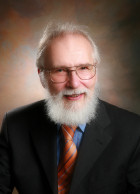
Affiliation:
TU Wien
Phone:
Office:
Raum CF 0306
Mail Address:
1040 Vienna
 |
Zugehörigkeit: Affiliation: |
Institut für Sensor- und Aktuatorsysteme TU Wien |
| Telefon: Phone: |
+43-1-58801-36658 | |
| Fax: | +43-1-58801-36699 | |
| Mail: | karl.riedling@tuwien.ac.at | |
| Raum: Office: |
Gusshausstrasse 25, 1040 Wien Raum CF 0306 |
|
| Postanschrift: Mail Address: |
Gusshausstrasse 27-29/366 1040 Vienna |
|
| Homepage: | Karl Riedling's Homepage |
Karl Riedling wurde 1948 in Wien geboren. Er schloss sein Diplomstudium der Elektrotechnik 1972 ab und promovierte 1979 an der TU Wien zum Doktor der technischen Wissenschaften. Er wirkte er an der Errichtung des ersten österreichischen universitären Halbleitertechnologie-Labors an der TU Wien mit, wo er an der Technologie von Planardioden aus Indiumantimonid und der Anwendung der Ellipsometrie in der Mikroelektronik-Technologie arbeitete. Im Rahmen von Forschungsaufenthalten bei IBM East Fishkill 1980/81 bzw. an der Arizona State University in den Jahren von 1985 bis 1987 leistete er Beiträge zur Automatisierung des Czochralski-Prozesses zur Herstellung von Einkristallen aus Silizium bzw. Galliumarsenid. Seine Habilitation für das Fachgebiet Technologie elektronischer Bauelemente an der TU Wien erfolgte 1988. Seit 1990 ist er Generalsekretär der Gesellschaft für Mikroelektronik.
Karl Riedling was born in Vienna, Austria, in 1948. He obtained his diploma and doctor's degrees in Electrical Engineering at the TU Vienna in 1972 and 1979, respectively. He assisted in the realisation of the first Austrian university-based semiconductor technology laboratory at the TU Vienna, where he worked on the technology of indium antimonide, and on the application of ellipsometry in microelectronics technology. As a postdoc at IBM East Fishkill in 1980/81, and as a visiting scientist at Arizona State University between 1985 and 1987, he contributed to the automation of the Czochralski growth processes for silicon and gallium arsenide single crystals, respectively. In 1988, he obtained the venia legendi for Technology of Microelectronic Components, and is now an Associate Professor at the institute. Since 1990, he is Secretary General of the Austrian Society for Microelectronics (GMe - Gesellschaft für Mikroelektronik).